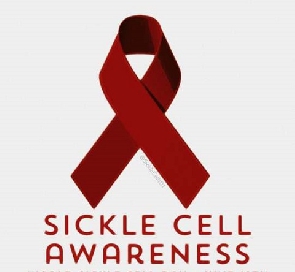A sickle cell patient has appealed to health professionals to urgently attend to sickle cell patients in crises who attend their facilities instead of asking them to queues and go through formalities.
Mr Joshua Offuh, the 27-year-old sickle cell patient, said joining queues and going through hospital formalities could lead to their untimely death.
Mr Offuh made the appeal in an interview with the Ghana News Agency as the world prepare to observe this year’s “World Sickle Cell Awareness Day” on June 19.
“Every Clinic staff must receive some training on the sickle cell condition and how to treat persons with the sickness”.
He said it was sad that most health workers did not see the urgency needed in the care of a sickle cell patient in crises adding that “the excruciating pain that drive them to seek medical attention could kill them if immediate help does not arrive.”
“When at the hospital they delay in taking care of us leading to more pain which can kill us”, he lamented.
He further urged them to acquire in-depth knowledge about the disease and how best to make sickle cell patients comfortable when attending to them at the hospitals.
According to him, he had encountered a number of situations during crises when laboratory scientists had worsened his pains and joint swellings due to the unprofessional way they collected blood samples.
He added that poor administration of injections was also another problem they faced in the hands of some nurses who had no knowledge on the volume of pain sickle cell patients went through.
Mr Offuh, who is an Information Technology student and sickle cell advocate with the Sickle Cell Condition Advocates, a non-governmental organization, said growing up with the sickness was not something that was exciting.
He narrated how he and his parents endured sleepless nights and several hospital admissions as he experienced an average of 10 crises a year.
He added however that the crises had reduced drastically as he made conscious effort not to be admitted at the hospital by sticking strictly to his medication, drinking more water, avoiding strenuous work, and obeying all his doctor’s instructions.
According to him, stigmatization was a problem he faced daily as most people including the educated had no knowledge about sickle cell adding that he virtually had no social life as joining friends out meant informing them of his condition to get the needed care in case of a crises.
Mr Offuh therefore appealed to government, organizations and individuals to support outreach programmes to educate people on the sickness and sensitize the youth to test before making babies.
Madam Florence Dotse, mother of Mr Offuh on her part, said two AS partners must not be encouraged to marry or make babies out of love as it was financially, physically, psychologically and emotionally costly to give birth and care for a sickle cell child.
Madam Dotse stated that she and her husband only knew their status after their son was diagnosed with the sickness at Korle Bu after several hospital visits in the Western Region.
She narrated that they started seeing symptoms of the sickness in their son when he was six months old, adding that it was unfortunate that he could not be diagnosed early by health officials at Half Assini where they were residing.
She added that because they did not know what the problem was, they resulted to using cold water on the swellings thinking it would cool the pain.
According to her, even though they had three children who are made up of two carriers and one AA, her son’s sickness had a toll on the family and therefore would not advice anybody to put their children through such pain.
She also urged parents with sickle cell patients not to neglect them but do their best to provide the needed care and love to make life meaningful for them.
Health News of Tuesday, 19 June 2018
Source: ghananewsagency.org

















